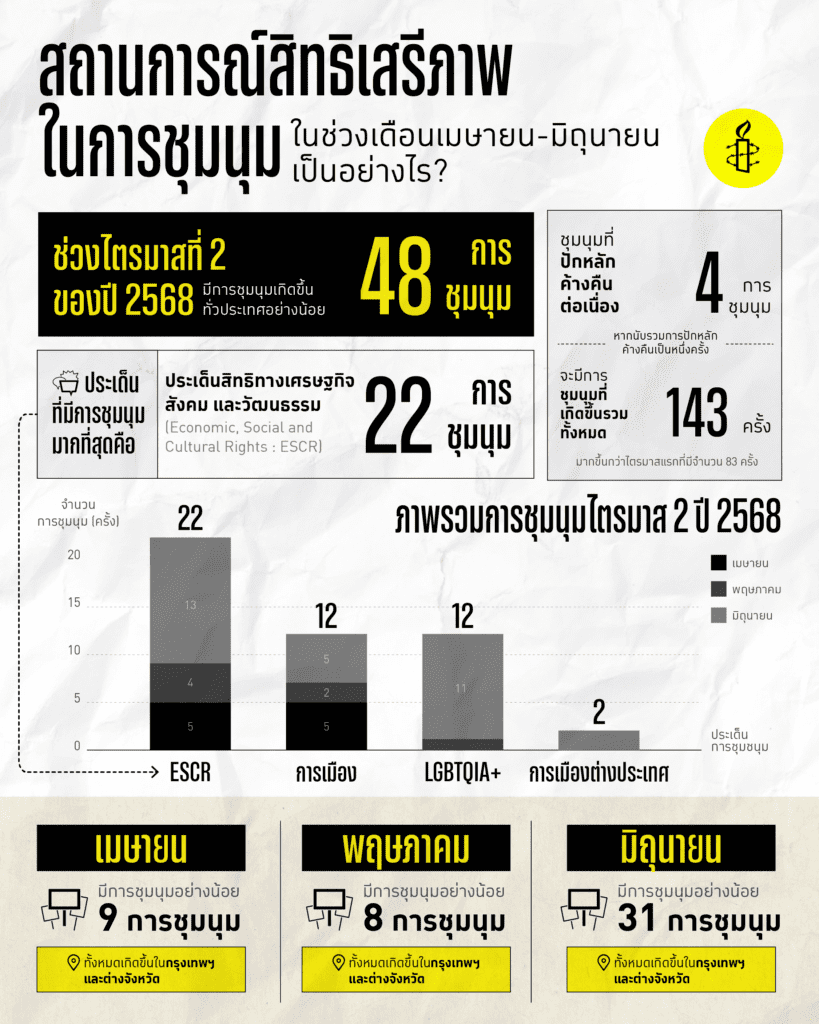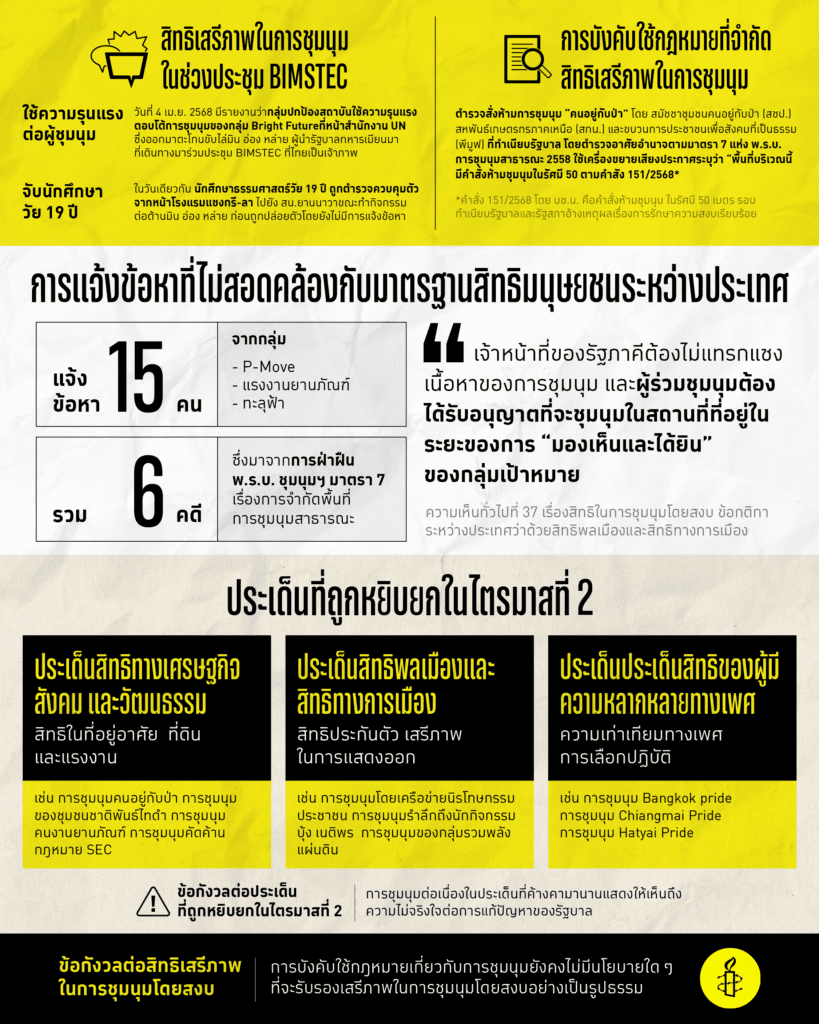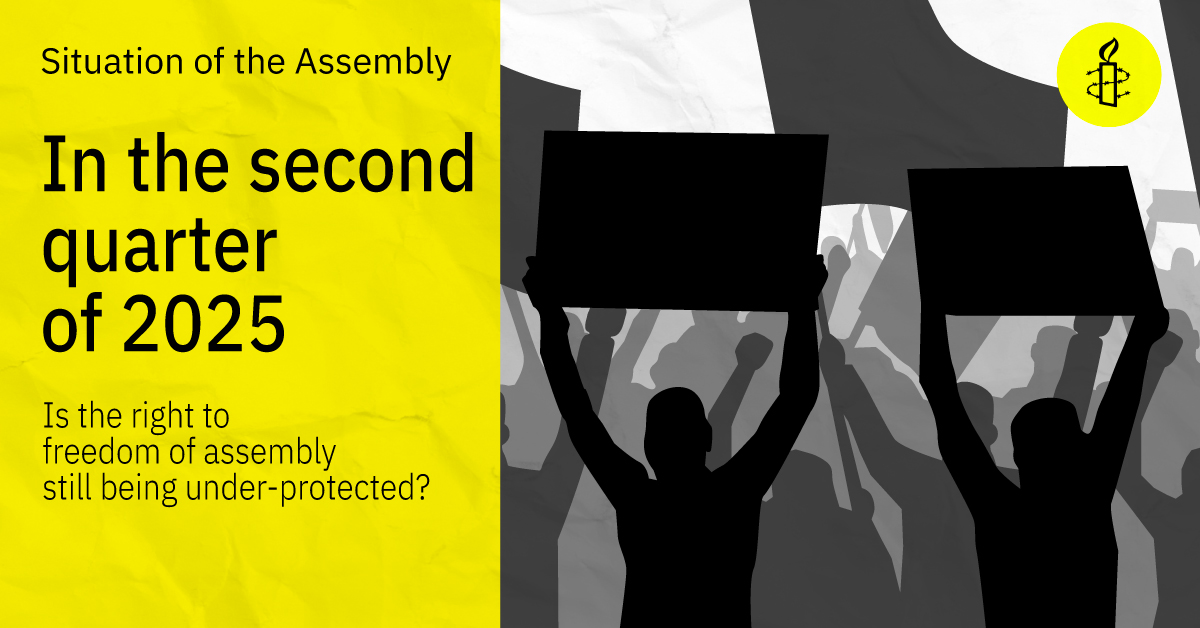Thai rallies surge to 226 in Q2 2025, reflecting the intensity of several issues: community and land rights, equal marriage, bipolar politics, and global politics.
During April-June 2025, Thailand witnessed a vibrant atmosphere of protests on a variety of issues. At least 48 demonstrations took place, and if the first consecutive overnight demonstrations were included, the total number reached 226, a 172 per cent increase from the first quarter (143), reflecting the intensity of the movement during this period.
The main issues of the protests during this quarter included 21 economic, social, and cultural rights (ESCR), covering land issues, forestry law enforcement, evictions, and community housing rights. Another critical issue that emerged during this period, mainly in June, was Pride Month. Despite the passage of the Marriage Equality Act, many issues remain to be fought for, as there are still many demands for legal and social equality that need to be discussed. Twelve rallies on these issues took place in at least 12 provinces.
Political issues continue to arise. An interesting point is the number of 12 rallies held by both political factions. Topics ranged from demands for bail for political prisoners to pressure on Ms. Paethongtarn Shinawatra’s resignation. This was due to the protests by the Student and People’s Network for Thailand Reform (SNP), along with the People’s Centre for the Protection of Institutions (PCRA), and the Dharma Army, which opposed the inclusion of the casino bill. Later, demands for Paethongtarn Shinawatra’s resignation as Prime Minister were added. The protests remained overnight. Although they later dispersed to other areas, they remained organised by the same group and made the same demands, making them one continuous rally.
The final issue was the demonstrations to demonstrate a stance on international politics, addressing the Palestine-Israeli situation and the situation in Iran. These demonstrations totalled two rallies.
The government still uses the Public Assembly Act 2015 to restrict freedoms, violating international principles, despite the diversity of public movements.
Despite the diversity of demands and the different political groups, the use of the law by those in power has failed to keep up with this diversity. It continues to stifle freedom of expression and assembly. The 2015 Public Assembly Act remains strictly enforced to block such demonstrations, a law that is still inconsistent with international principles. In particular, the International Covenant on Civil and Political Rights (ICCPR), to which Thailand is a party, specifically the use of Article 7 to ban gatherings within a 50-meter radius of Government House, which violates the “principle of sight and hearing.” For example, in April, Order 151/2568 from the Metropolitan Police Bureau, which banned gatherings within a 50-meter radius around Government House and Parliament, remained in effect until April 6, 2025, citing the need to prevent unrest from groups likely to establish themselves near government land. Prosecutions under the Public Assembly Act of 2015 remain in effect. On May 26, 2025, Dusit Metropolitan Police Station filed charges against 15 protesters in six cases: four cases related to the gatherings of P-Move and the Forestry-Land Network, and two cases related to the gatherings of the Yanphan Labour Group. All cases were subsequently forwarded to the prosecutor. All of these occurred in violation of the prohibition order issued under Section 7 of the Public Assembly Act B.E. 2558 (2015).
A summary of the monthly protests can be found in the chart below.


The protests continue because demands are not being addressed, not because the state promotes human rights.
Mr. Faozee Lateh, Policy Campaign Officer at Amnesty Thailand, commented on the current protest situation, saying, “Most of the protests in the second quarter revolved around the same issues, reflecting unresolved demands, particularly regarding megaprojects that may impact housing rights and other human rights, or even the right to bail. As a result, the protests continued. While these protests continued, they did not reflect the promotion of human rights within the country. Conversely, the situation of the closure of protests and the prosecution reflected the natural number of protests in a democratic society, not the government’s genuine respect, protection, and promotion of human rights.”
Second Quarter Summary
The second quarter of 2025 saw a period of growth in the volume and diversity of civil society movements, particularly on the ESCR and LGBT rights. National and international politics remained key factors in fueling the protests, while the state continued to restrict areas and prosecute protesters. This is an issue that needs to be closely monitored.
Read the full report
Report on the Situation of the Right to Freedom of Assembly in the Second Quarter of 2025


